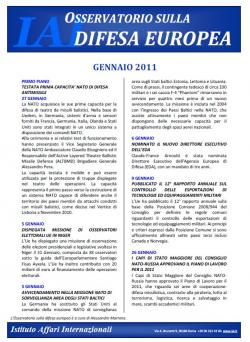Observatory on European defence, November 2003

17 November 2003
EU General Affairs and External Relations Council - Defence Agency, Iraq
The GAERC, gathered in Brussels, discussed several issues concerning the European Security and Defence Policy.
The Council decided to establish, by 2004, the European Defence Agency, an intergovernmental framework operating in the field of military capabilities, development, research and armaments acquisition, promoting the industrial base and defence market. Europe’s draft Constitution foresees the establishment of a similar Agency.
The Agency’s tasks will be:
- developing military capabilities through identification of operational needs and common requirements, and establishing financial priorities;
- promoting cooperation in the field of armaments, developing multinational programmes and collaborating with OCCAR (Organisation conjointe de Coopération en matière d’Armement) initiatives;
- harmonizing the European defence market using the LoI (Letter of Intent) - Framework Agreement;
- promoting the industrial and technological base of European defence;
- promoting research activities in the field of defence.
The Agency institutional and operational details will be defined by the Council in April-June 2004 on the basis of proposals put forward by an ad hoc working group.
The Agency will be directed by the Secretary General/High Representative and will receive directives from a Steering Board, composed of European Defence Ministers with the participation of the European Commission.
The development of future EU military capabilities was discussed; they should permit, by 2010, a wider operability and interoperability among armed forces.
The French General Jean-Paul Perruche was appointed the new Director-General of the EU Military Staff from 1 March 2004.
The Council included the fight against proliferation of weapons of mass destruction as a key element in establishing relations with third countries.
The recent Iranian decision to accept the international community’s requirements regarding its nuclear programme was discussed.
Finally, the Council examined the situation in Iraq, condemning the 12 November attack against the Italian mission (19 Italian victims) and once again confirming Europe’s commitment to reconstruction, even if under difficult general conditions, wishing for a wider role for the UN as well as a faster local government take-over of powers.
19-25 November 2003
EU-NATO - First Joint Exercise
The first joint EU/NATO crisis management exercise, called CME/CMX 03, was held. The respective decisional-making processes and interoperability capabilities were tested in the ‘Berlin Plus’ arrangements framework.
28-29 November 2003
EU Ministers of Foreign Affairs IGC (Intergovernmental Conference) - Defence
EU Defence Ministers, gathered in Naples for the IGC, discussed the European defence project included in the Constitutional text.
They agreed to an arrangement - supported mainly by France, Germany and the UK - that foresees the possible development of permanent structured cooperation among a subgroup of European countries in the defence field, open to all members that demonstrate their intention and capability to share the objectives; this kind of cooperation should be defined by a Protocol including objective participating requirements.
Defence questions, including the armaments agency, structured cooperation (Articles I-40 and III-213), the delicate issue of the disputed mutual defence clause (Articles I-40 and III-214) and possibly an autonomous EU planning capability, will be examined again at the IGC summit foreseen for 12-13 December.
The discussion was preceded by an Italian Presidency proposal on defence made public on 25 November, and by a bilateral summit between France and UK on defence issues.
November 2003
EU-ESA (European Space Agency) - Space, Security and Defence
The EU space policy was widely discussed in November.
On 11 November, a White Paper on space was presented, including important indications on future perspectives in the space field in EU policies.
A cooperation agreement between the EU and ESA was initialled on 25 November.
The value of space policy has been explicitly recognized as the horizontal qualifying element for EU policies, including security and defence policy. Moreover the EU’s space activities, and particularly the Galileo project (the positioning, timing and navigation satellite system worked out by the EU and ESA, open to wide applications in the field of security and defence), were discussed, including specific arrangements with third countries, among which China and India.
-
Details
Roma, Istituto affari internazionali, 2003 -
Issue
03/11


